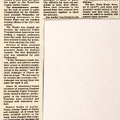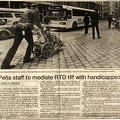The Cincinnati Post Saturday, June 21, 1986
125 East Court ST, Cincinnati, OH 45202 513-352-2000
Editor Paul F. Knue
Managing Editor J. Stephen Fagan
Editorial Page Editor Claudia Winkler
Associate Editor James L Adams
Editorials
Title: Transit for the disabled
The recent tactics of the handicapped militants who attempted to block traffic, obstruct entry to the Westin Hotel and stop buses by grabbing onto the wheel wells to protest the lack of wheelchair lifts on public buses detracted from the legitimate claims of the disabled for better transit service in Cincinnati.
The fact is bus service for the handicapped here is inadequate. On that score, Queen City Metro management and the handicapped agree. Both sides also agree that dwindling public transit funds compound the problem.
It is a problem, however, that Queen City Metro needs to resolve. Service for the disabled should be improved and expanded.
Metro officials sat down four years ago with the Specialized Transportation Advisory Committee, representing the handicapped, and worked out a five-year plan to develop service for the disabled. The plan called for providing curb-to-curb service with a fleet of vans called Access. But a shortfall in public funds prevented that plan from being fully implemented. As a result, the committee is charging Metro with failing to keep its promise.
On the surface, the Access service is impressive. The 15 vans operate six days a week and make as many as 400 trips a day, carrying 105,000 passengers annually for 60 cents a ride. But the demand is so great that handicapped persons often have to wait as much as a week or longer to get a van to carry them to the dentist or grocery store. Understandably, frustration is mounting.
Now the disabled are lobbying for dual service—Access vans and expensive lift-equipped buses on the regular routes. The handicapped contend they have as much right to ride the bus as able-bodied citizens. But Tony Kouneski, Metro president, still believes he can get more for the money—serve more disabled people—by expanding Access.
Kouneski’s argument is hard to refute. Experience in some other cities bears him out. In Los Angeles, 1800 buses equipped with lifts are transporting all of 40 wheelchair users a day.
But the issue has now become philosophical as well as financial, and Queen City Metro officials must take care to remain responsive.
The leaders of the handicapped in Cincinnati are to be commended for their refusal to participate in the demonstrations staged by the Denver-based group. Metro management, by demonstrating its good faith, should make sure that the handicapped never regret their choice.
- Created on
- Thursday 11 July 2013
- Posted on
- Wednesday 8 June 2016
- Albums
- Visits
- 1695
- Rating score
- no rate
- Rate this photo


0 comments